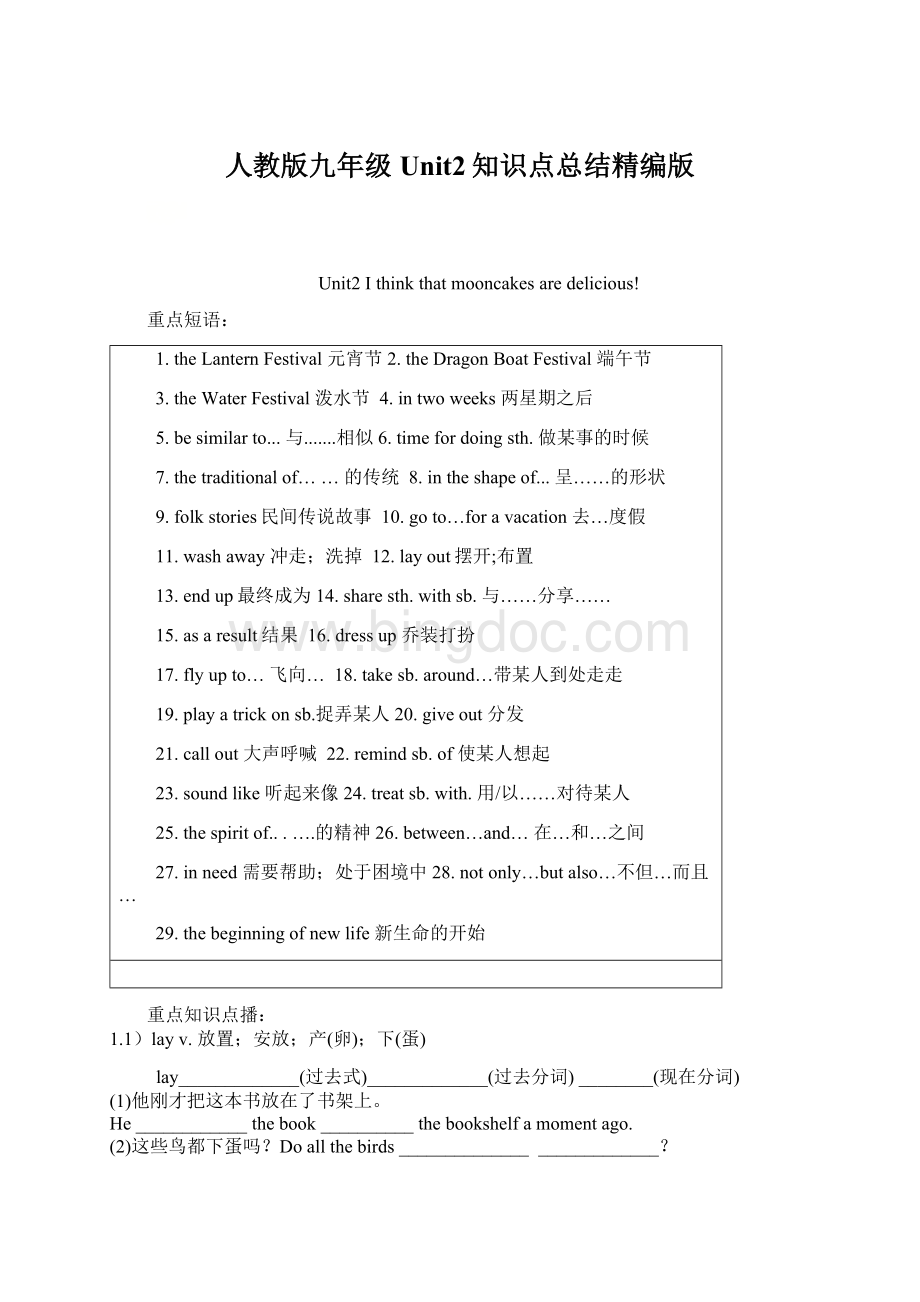人教版九年级Unit2知识点总结精编版文档格式.docx
《人教版九年级Unit2知识点总结精编版文档格式.docx》由会员分享,可在线阅读,更多相关《人教版九年级Unit2知识点总结精编版文档格式.docx(9页珍藏版)》请在冰点文库上搜索。

things
are________on
sofa
and_________TV.
这个聪明的男孩很擅长撒谎。
The
smart
boy
is
________
_______.
你在说谎,但谎言掩盖不了事实。
You
______and
________can
not
cover
up
facts.
2.1)
put
on增加(体重);
发胖,增肥反义词lose
I'
ve
five
pounds!
到目前为止他减了10磅。
______
________ten
pounds
so
far.
2)put
on穿上,戴上,其反义词是take
off脱下
他穿上大衣,然后出去了。
______his
coat
and
then
out.
3.
dead
形容词
die
作动词,意为“死”,是短暂性动词,不能和时间段搭配。
若表示“死了多长时间”要用延续性的be
dead。
death
作名词,意为“死;
死亡”。
dying
现在分词
用death,
die,
dead,dying填空。
1).
Liu
Yang
afraid
of
2).Smoking
causes
illnesses
even
3).The
insect
________.
4).
His
grandfather
_____
three
years
5)The
old
man
died
two
ago.(改同义句)
=
____
___
for
6).(
)The
dog
quite
some
time.
A.has
B.die
C.has
D.has
been
4.
dress
up穿上盛装;
打扮
让我们打扮一下,去参加聚会吧。
Let'
s
_______
go
to
party.
as意为“打成”
On
Christmas
Day,
his
father
used_______
_______a
Santa
Claus.
5.
on,
wear,
dress与be
in
词条
用法
强调“穿;
戴”的动作。
wear
戴”的状态,其后可以跟衣服、鞋帽、首饰等。
意为“穿衣”,其后只能跟表示人的名词或代词,不能跟衣服、鞋帽等。
be
表示“穿;
戴”的状态,其后可跟表示衣服或颜色的词汇。
用put
wear或dress的适当形式填空
(1)It'
cold
outside.
You'
d
better
thick
when
you
(2)—Do
know
girl
who
pink
dress?
—Yes,
do.
She
my
sister.
(be
wearing=be
in)
(3)
enough
herself.
6.
end
up最终成为;
最后处于
doing
sth.
结束做某事=
finish
with…以……为结束;
以……而告终
活学活用
1).挥霍浪费者最后往往负债。
Wasteful
people
usually
debt.
2).
(
)In
end,
they
ended
up________
Chinese.
A.speak
B.spoke
C.to
speak
D.speaking
3)Yesterday
our
class
meeting________
________an
English
song.
7.
辨析:
used
do
/
/be
do,表示______________,是过去时态,用于描述过去常常发生的动作或存在的状态。
我过去害怕黑暗。
to________(be)
dark.
be/get
doing,表示_______________.
玛利亚习惯早起。
Maria
to__________(get)up
early.
do,
表示_______________,相当于
_____________.
火可以被用来做饭。
Fire
can
cook
food.=
food.
练习
1.
Mother
_____us
stories
we
were
young.
A.
telling
B.
tell
C.
D.
2.我习惯走路上学。
school.
smoke,
_______?
(完成反义疑问句)
4.李先生过去住在美国,所以习惯吃西餐。
Mr
Li
America,
he
western
to_____
an
room.
There;
have
It;
having
小刀是用来切东西的。
Knives
_____things.=
_____things.
8.famous
辨析:
famous
for以…而闻名
中国以瓷器而闻名。
China
china.
as+职业
作为…而闻名
姚明作为一名篮球运动员而闻名。
Yao
Ming
basketball
player.
9.
1)not
only
...
but
(also)
不但…而且”是一个并列连词词组,其意思基本相当于“both
…_______...”
2)not
..
but(also)..连接两个主语时,谓语动词用就近原则。
Not
also
your
brother_________(have)to
stay
at
home.
=Not
brother
you_________(
have)to
home.
3)not
only连接两个简单句时,not
only可以放在句首表示强调,句中的主谓要倒装(倒装结构),but
引导的句子不倒装。
我不仅喜欢英语,而且我还非常喜欢数学。
like
English,
math
very
much.
练习:
1)Not
she
_____(like)math.
Both
________(like)
math.
2)
Jim
hia
parents
______(be)going
cinema
tonight.
3)
他们不但需要食物,而且还需要水。
____need
food
need
water.
10.
Sth
popular
sb.=Sb
with
This
song
is_________
________young
people.=Young
are_________
_________this
单元语法聚焦:
一.宾语从句
We
him.
简单句
likes
English.
宾语从句
结论:
宾语从句就是由一个句子来构成主句的宾语
宾语从句三要素:
连接词、语序、时态
连接词:
1).陈述句→that
(that
在句中无词义,在从句中不能充当句子成分,在口语中往往被省略。
)
2).一般疑问句→if/whether(主句
+
if
whether
由一般疑问句变成的陈述句形式)
3).特殊疑问句→原有的特殊疑问词+句子剩余部分的陈述句形式
语序:
陈述句语序(主句
+连接词
+主语
+谓语
+其他成分.)
时态:
①当主句是一般现在时,从句用该用的时态(即从句的时态不受影响)
②当主句是一般过去时态,从句必须用过去的某一时态。
1).The
teacher
says
“We’ll
exams
next
Friday.”
→The
we’ll
Friday.
said,“I
help
him.”→The
said
(that)
could
him.
人称的转换规律:
一随主,二随宾,三不变。
April
hottest
month
year.
(I
believe…)__________________________________________________
2.
It
was
little
crowded.
guess…)______________________________________________________
races
interesting
watch.
(Bill
thinks
…)__________________________________________
Water
Festival
really
fun.
knew…)
_______________________________________________
2)Li
Lei
wonders
.
Is
?
→
in.
doctor
Has
taken
any
medicine
has
medicine.
Tom
asked
me,“Are
student?
”→Tom
me
student.
练习:
1.Is
home?
wonder…)
___________________________________________
June
good
time
visit
Hong
Kong?
wonders…)
____________________________________________
Does
sports?
know…)__________________________________________________
Will
play
after
school?
asked…)
__________________________________________________
特别强调:
If
与whether
的区别(不可替代的情况)
1.I
don’t
will
come
or
not.(与or
连用只能用whether)
2.That
depends
___________he
back.(介词后只能用whether)
3.He
wondered
_____________to
here
week.(后与to
不定式连用只能用whether)
4.____________he
decided.
(句首只能用whether)
3)He
asks
me,“What
does
do?
”→He
what
does.
me,“Where
did
yesterday?
where
went
yesterday.
1.He
Lucy,“What’s
subject?
”
2.Can
me,“Why
much?
3.Do
know,“Where
nearest
post
office
4.I
boy,“Which
best?
注意:
宾语从句的否定转移:
如果主句的谓语动词是
think,
believe,
guess
等,而且主句的主语又是第一人称时,它后面接的宾语从句的否定词通常要前移到主句中,即否定主句中的动词,而从句用肯定形式.(主语为第一人称,否定在主句,翻译在从句。
翻译:
我认为不会下雨.I
it
_________.
我认为你的答案不对.
______your
answer
___________
right.
我们相信他还没走.
____________.
二.
感叹句:
是表示惊讶、赞美、喜悦、愤怒等情感的句子,通常由what或how引导。
常见结构:
1)What
a/an+形容词+可数名词的单数(+主语+谓语)!
他是多么聪明的一个男孩啊!
What
_________
is!
2)What+形容词+可数名词的复数(+主语+谓语)!
你们是多么好的学生啊!
__________you
are!
3)What+形容词+不可数名词(+主语+谓语)!
今天的天气真好!
What__________
today!
4)How+形容词或副词(+主语+谓语)!
这个故事多么有趣啊!
story
那个男孩跑得真快啊!
runs!
5)How+主语+谓语!
(句子)
我多么想念妈妈啊!
How______
_______my
mother!
填入适当的词完成下列感叹句。
1.________
difficult
homework
had
yesterday!
2.________
honest
!
3.________
exciting
news
!
4.________hard
work
5.________
scary
these
tigers
Hei
Longjiang
looks
beautiful
winter.
(改为感叹句)
winter!
7.It
useful
dictionary.
dictionary
8.He
playing
(改为感叹句)________
basketball!
单项选择:
1.
Mo
Yan
won
Nobel
Prize
Literature
last
excellent
A.How
B.What
C.What
D.What
2.________
clever
3.—Have
heard
Zhang
Lili?
seriously
hurt
accident
order
save
one
her
students
—________
teacher!
4.________
wonderful
concert
putting
city
square!
5.—________
hard
Tony
working!
—Yes.
should
learn
from
A.What
B.How
D.How
6.________
great
picture!
Who
painted
it?
C.How
7.Idon'
tknow__hewillcometomorrow.__hecomes,I'
lltellyou.
A.if;
WhetherB.whether;
Whether
C.if;
ThatD.if;
If
8.Idon'
tknow_________thedayaftertomorrow.
A.whendoeshecome
B.howwillhecome
C.ifhecomes
D.wheth